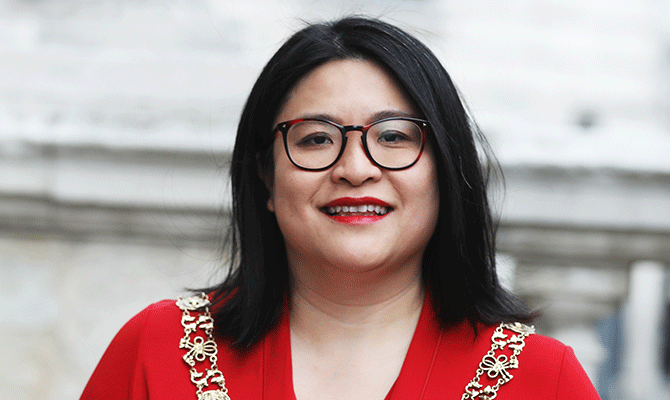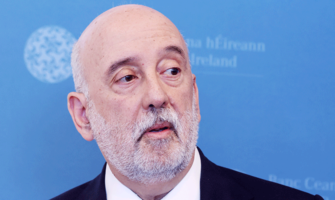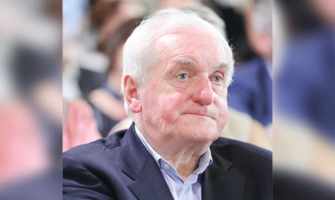
Hazel Chu
WITH THE Green Party falling back in the opinion polls from the high points of the 2019 and 2020 local and general elections – when it had its highest number of representatives elected – many party activists must be wondering if the surge is over before they even get the chance to strut their stuff on the major political stage.
Among these, of course, is Hazel Chu, the 40-year-old Lord Mayor of Dublin, the first person of Chinese extraction to hold this position or indeed any elected political position in Ireland.
Unlike many Greens, Chu is not from the comfortable middle class. Her parents met while working in Chinese restaurants in Dublin and only later managed to set up their own restaurant businesses. She is the first person in her family to finish school and get a university education.
Chu worked her way through UCD, studying history and politics, before being called to the bar in 2007, though for financial reasons she never practised as a barrister. Instead, she worked in a number of companies, beginning in the not-for-profit sector, fundraising for St Michael’s House and spending some time teaching in China. She then worked as a marketing consultant in New York for Bord Bia, before returning to Ireland to work in Forfás, followed by the National Digital Research Centre and, finally, as head of communications for Diageo.
Not bad for a Firhouse girl whose parents were immigrant workers.
While always active in political debates as a student, it wasn’t until she met her partner, Patrick Costello – the Dublin South Central TD for the Greens – that she got directly involved. She managed his election campaign in the 2014 local elections, guiding him to a poll-topping performance in Kimmage-Rathmines.
This sharpened her own interest in active politics, and in 2016 she joined the Greens, getting involved at every level. With Catherine Martin and Grace O’Sullivan she helped found Mná Glasa, the party’s women’s group, and was elected National Coordinator in 2018.
Most significantly, from the beginning, she emphasised the need for action in relation to climate change to be matched by concern for the social rights of citizens. It is no surprise that she is now very much on the Just Transition wing of the party.
She made her breakthrough into an elected position in the 2019 local elections when she topped the poll in the Pembroke electoral area, scoring a massive 33% of the total vote.
Her electoral area – and part of Costello’s – make up a considerable part of the Dublin Bay South Dáil constituency, where party leader Eamon Ryan comfortably held a seat in the last election. Indeed, Chu and Costello had between them amassed a striking 7,800 votes (6,000 in the constituency area).
This suggested that the Greens could win two seats here, but Ryan was dead set against running Chu and insisted on a one-candidate strategy. Chu then put herself forward to run for the Seanad, but again Ryan said no, arguing that the party should concentrate on putting people forward in constituencies where it had no representation. Nevertheless, Chu was then put forward to run for the chairmanship of the party, and somewhat surprisingly beat Ryan’s preferred candidate, Pauline O’Reilly.
Despite this, Chu was again passed over when Ryan nominated Vincent P Martin – brother of deputy leader Catherine Martin – and staunch Ryan supporter Róisín Garvey as Taoiseach’s nominees to the Seanad.
Chu’s experience as Diageo’s head of communications has stood her in good stead, however, as she has managed to maintain a high public profile despite the leadership’s cool attitude towards her.
Naturally, given her background, she is a fluent Cantonese speaker, but she has spoken enthusiastically and passionately about the importance of the Irish language to the people of this country. This clear expression of Irishness has not protected her from vicious racist abuse – online and from demonstrations by far-right extremists outside her home.
Her strong profile has been met with considerable suspicion by the Ryan camp, especially as relationships within the Green Party deteriorate. Peadar Kavanagh, the Green councillor from Clondalkin who resigned from the party recently, cited a toxic atmosphere that had grown in the party as a major factor in his decision, arguing that the group around Ryan treated any disagreement with the leader as treason.
Kavanagh has been subjected to online abuse as well for his dissent, and he came to the conclusion that he was not welcome in the party. Shades, indeed, of Senator Róisín Garvey’s pithy comment when Catherine Martin failed (just) in her bid to wrest the leadership from Ryan: “Fuck her [Martin],” she declared.
A series of councillors and significant party figures have followed each other in resigning from the party including: Saoirse McHugh, the poster girl in the European election broadcasts; Lorna Bogue, a Cork councillor; Tara Gilsenan, chair of Young Greens/Óige Ghlas; Tiarnan Mason, chair of Queer Greens/Glasa Aiteacha; Liam Sinclair, Greens leader on South Dublin County Council; and Sophie Nicoullaud, a councillor on Dublin City Council.
All is not well, then, in the state of Denmark, but these resignations strengthen Ryan’s grip on the organisation as leading radicals drift out one by one. Increasingly, Ryan supporters like Carlow’s Malcolm Noonan TD are becoming more disparaging of “malcontents” like Chu and Neasa Hourigan in Dublin Central.
The problem is that party support is falling rapidly. From the highs of 2019 and 2020, when the party scored 7% in voting support, it has now fallen to a regular 3% or 4% in the polls. Furthermore, many of its seats were won courtesy of transfers from Sinn Féin, due partly to the latter not fielding enough candidates to maximise its vote. That mistake will not be made again, so it is most likely that the Greens will lose at least half of their current seats unless circumstances radically change.
These figures might prove the point that supporting right-wing policies in government – such as the proposed CETA trade deal with Canada (which a Green convention voted to oppose) – damages the party. But there is no sign that Ryan’s grip on the party organisation is being weakened, despite the presence of Chu and others on the national executive.
Chu, however, is determined to stay the course, and is looking to the local membership to override Ryan’s opposition come nomination day for the next general election. But even with that, would there be enough Green votes left to elect two TDs, or would she perhaps be able to unseat Ryan?
Meanwhile, current reaction from Ryan et al to the suggestion that Chu stands in the Seanad byelection on the Industrial and Commercial panel has been one of frosty silence.




















